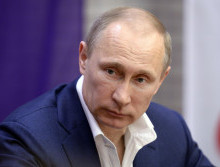
Will PM Netanyahu & Russian Pres. Putin work together to fight Hezbollah? Illustrative. Photo courtesy of the office of the President of Russia.
Russia vaguely but ominously stated their willingness to join Israel in opposing “international terrorism” last week, one day after news broke that Hezbollah had rebuffed a Russian call for the terrorist group to leave Syria. Russian President Vladimir Putin and Israeli Prime Minister Benjamin Netanyahu “expressed readiness to boost the coordination of their actions with regard to Syria, including in countering international terrorism” during a call together on Friday, according to a statement posted to the Russian Presidency’s website.
While Hezbollah was not mentioned by name, the “terrorism” reference was an unusual inclusion in the brief press release, as it did not appear in numerous Russian press summaries of Putin-Netanyahu calls throughout 2018. It also comes as the Hezbollah and Russia relationship is getting rocky, despite both being allies of the Syrian regime in that nation’s civil war.
Israel Hayom reported that Hezbollah was still in Syria as of last Thursday—according to the Syrian Observatory for Human Rights group—despite a Russian request for the Lebanese terrorists to leave Syria per a Russia-Israel agreement. The report specifically noted the Russians and Hezbollah had not battled each other yet—which would be a dramatic development—and raises questions about how far Russia is willing to go to keep it’s Syrian plan. Israel has already made it clear how far they will go.
Netanyahu has repeatedly highlighted the danger posed by Iranian forces—which include proxies like Hezbollah—remaining in Syria. On Sunday, he reiterated his willingness to take “action” against Hezbollah to prevent them from setting up a new base inside Israel’s northern neighbor.
Informing his cabinet what he told Putin in their call, Netanyahu was quoted by an Israeli statement as saying on Sunday, “We will take action—and are already taking action—against efforts to establish a militarily presence by Iran and its proxies in Syria both close to the border and deep inside Syria. We will act against these efforts anywhere in Syria.”
The Israeli-Iran-Hezbollah conflict has reached new heights in 2018, as Israel and Iran have openly engaged each other across the Syrian border. This follows years of reports of Israeli action in Syria to prevent advanced weapons from being transferred to Hezbollah.
Israel’s summary of the latest Putin-Netanyahu call did not mention terrorism, but Netanyahu’s comments marking Russia’s National Day last week did. Commenting on the two countries’ “great friendship,” Netanyahu was quoted by his office as saying last Thursday, “We think that it’s born of a common history, but also of common interest. We are united in our desire to fight terrorism. We are united in giving a better people, a better future for our peoples. We cooperate in so many ways.”
Whether that cooperation will include battling Hezbollah in Syria is now a looming question in the ever-complicated Syrian civil war saga.
(By Joshua Spurlock, www.themideastupdate.com, June 17, 2018)
